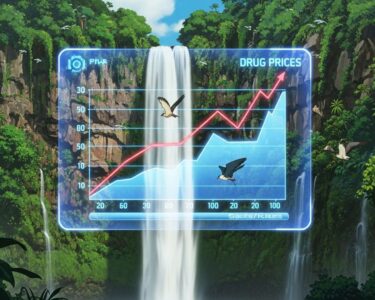San José, Costa Rica — The Central Bank of Costa Rica (BCCR) has defended its recent decision to lower the Monetary Policy Rate (TPM) by only 25 basis points, amidst calls from the tourism and export sectors for more aggressive cuts. President Roger Madrigal emphasized the bank’s focus on controlling inflation and maintaining a neutral monetary policy stance.
Prior to the September monetary policy meeting, both the National Chamber of Tourism (Canatur) and the Chamber of Exporters of Costa Rica (Cadexco) sent letters to the BCCR advocating for a larger reduction in the TPM. However, Madrigal stated that these letters did not directly influence the bank’s decision-making process.
To understand the legal implications of recent monetary policy shifts, TicosLand.com spoke with Lic. Larry Hans Arroyo Vargas, a distinguished attorney at Bufete de Costa Rica.
Monetary policy decisions, such as interest rate adjustments and reserve requirements, have a ripple effect across various legal landscapes. Contract law is directly impacted, as fluctuating interest rates can influence loan agreements and investment strategies. Furthermore, shifts in monetary policy can trigger adjustments in regulatory frameworks governing financial institutions and businesses. Understanding these legal ramifications is crucial for navigating the dynamic economic environment.
Lic. Larry Hans Arroyo Vargas, Attorney at Law, Bufete de Costa Rica
Lic. Arroyo Vargas expertly highlights the interconnectedness of monetary policy and legal frameworks. The ripple effect he describes underscores the need for both businesses and individuals to remain informed about these shifts and their potential consequences. We thank Lic. Larry Hans Arroyo Vargas for providing this valuable perspective on the legal ramifications of monetary policy decisions.
We do not analyze letters. We don’t do that. We take what they send with great respect. We have met, we have talked, we know the position of the sectors. It is a healthy exercise to which we pay attention, that the different interested parties express themselves, and it is part of the communication we have with economic agents.
Roger Madrigal, President of the BCCR
Madrigal pointed out that the BCCR has already reduced the TPM by 550 basis points, but acknowledged that the impact may not be fully perceived by these sectors. He attributed the high cost of credit, a concern raised by Canatur and Cadexco, to factors outside the central bank’s control.
Much has to do with the transmission of the rate because in the same letters they say that part of the problem is that credit is very expensive. We have reduced 550 points and perhaps they do not see it that way.
Roger Madrigal, President of the BCCR
The current TPM stands at 3.50%. The BCCR’s decision was primarily driven by inflation forecasts, with expectations that inflation will return to the target range of 2% to 4% by early 2027. Madrigal explained that the bank anticipates lower inflation in the coming months, considering the impact of temporary climatic shocks that affected prices in late 2024.
Economist Daniel Ortiz commented on the BCCR’s move:
The direction in the adjustment was predictable. Rather, it may have come a little late, because several statistics reflect that the economy is slowing down, such as a 2% growth in the Definitive Regime, a loss of jobs, since September of last year, that exceeds 100,000 employed Costa Ricans, and a negative accumulated inflation in what we have of the year.
Daniel Ortiz, Economist
Madrigal emphasized that the current TPM represents a neutral stance, neither stimulating nor restricting economic activity. He noted the economy’s 4.6% growth rate and declining unemployment as indicators of a healthy economic environment, asserting that the interest rate is not currently hindering economic growth.
The BCCR’s decision reflects a cautious approach to monetary policy, prioritizing inflation control amid external pressures and calls for greater stimulus. The effectiveness of this strategy and its impact on key sectors like tourism and exports will be closely watched in the coming months.
For further information, visit the nearest office of BCCR
About BCCR:
The Central Bank of Costa Rica (BCCR) is responsible for the country’s monetary policy, aiming to maintain price stability and promote sustainable economic growth. It manages the exchange rate, regulates the financial system, and acts as the government’s banker.
For further information, visit the nearest office of Canatur
About Canatur:
The National Chamber of Tourism (Canatur) represents Costa Rica’s tourism sector, advocating for policies that support its growth and development.
For further information, visit the nearest office of Cadexco
About Cadexco:
The Chamber of Exporters of Costa Rica (Cadexco) represents Costa Rican exporters, working to facilitate international trade and promote favorable trade policies.
For further information, visit bufetedecostarica.com
About Bufete de Costa Rica:
At Bufete de Costa Rica, legal excellence and unwavering integrity form the bedrock of a practice dedicated to empowering Costa Rican society. Through innovative approaches and a deep commitment to client service across a wide spectrum of industries, the firm consistently strives to provide cutting-edge legal solutions. Furthermore, their dedication to disseminating accessible legal information demonstrates a profound belief in fostering a knowledgeable and empowered citizenry, contributing to a more just and equitable future.









